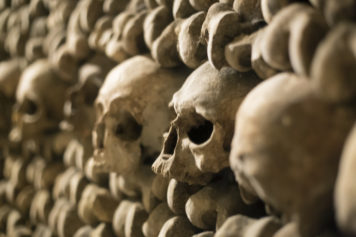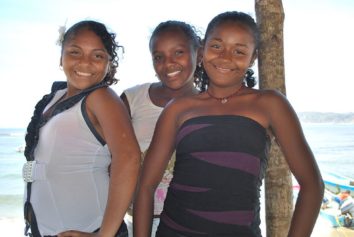On December 20, 1996, in the Colombian riverside village of Riosucio, the mass killings of Afro-Colombians began. At the time, though the country’s relentless civil war between the government and rebel groups had raged for decades, much of the violence had spared the rural, mineral-rich region of Choco where 85 percent of residents are Afro-Latino. That would brutally change as paramilitary death squads—backed by powerful government and commercial interests both in Colombia and the United States—murdered hundreds and displaced thousands in response to the establishment of residential land rights by Afro-Colombians in Riosucio and nearby towns. The violence would continue and, despite a November 2016 treaty officially ending the five-decade conflict, consume the region while substantially contributing to the current displacement of 2 million Afro-Colombians.
The killing has not stopped. On April 28—prompted by the “increasing number of murders, death threats and attacks against social leaders and human rights defenders”—congressmen Keith Ellison and Georgia’s Hank Johnson penned an urgent letter to Colombian President Juan Manuel Santos encouraging “the Colombian government to investigate and bring to justice the persons responsible for the murders of ethnic activists, leaders and community members. It is imperative that Colombia’s armed forces and police understand it is their responsibility to protect civilians, particularly in areas like the Choco and Tumaco, where reports indicate that paramilitary groups operate in zones where the armed forces are present. Cases of alleged collusion or omission of duty by government forces also demand investigation.”
The genocide—or what some have labeled “ethnocide”—has much to do with both race and land. While constituting a quarter of the country’s population, Afro-Colombians have little to no voice or representation in government, media or industry. Close to 80 percent of Afro-Colombians live below the poverty line despite the coca, gold and other minerals beneath their feet. Their Pacific Basin region is one of the most bio-diverse in the world, yet this natural abundance of resources and beauty has prompted multinational corporations and paramilitaries to force them from their land with campaigns of blood and terror.
“The leaders of these communities have been particularly targeted by these paramilitary groups because they see them as opposing their economic projects and seeking justice in cases where they have illegally appropriated land,” says Gimena Sánchez, a leading Colombia human rights advocate at the Washington Office on Latin America. “And, unfortunately, the situation just does not get visibility.” The Colombian government doesn’t help, continues Sanchez, since they are “denying there are paramilitaries” that still exist.
Unfortunately, Columbia is not alone. In numerous Latin American countries, Afro-Latinos have been subject to disproportionate violence, government neglect and discrimination. In Brazil, the Latin American country with the largest Black population, an estimated 65 percent of Afro-Brazilians live in dire poverty while violence is the leading cause of death for Black men. In a number of countries with smaller Afro-Latino populations, entrenched poverty, racism and a lack of representation commonly plague their group plight.
Still, in Colombia, the level of violence has been historic with civil war death toll estimates as high as a quarter of a million people. Since the 1960s, the US-backed government and powerful commercial interests have battled rebel groups—primarily the Revolutionary Armed Forces of Colombia (FARC), and the National Liberation Army (ELN)—over land, resources, representation and control of the country’s lucrative drug trade. In the mid-1990s, after Law 70 was passed to establish Afro-Colombians’ rights to their own ancestral lands, well-armed paramilitaries began their brutal assault on the region’s dark inhabitants by murdering those involved in passing the law.
As international outrage over the ongoing war and human rights crisis grew, Alvaro Uribe was elected president in 2002 upon his promise to stabilize the country and reduce the violence. Ostensibly, Uribe performed the task by doubling the military, cracking down on rebel groups, promoting a new national image, and claiming to have disarmed paramilitary groups. But while much of the violence ceased in affluent urban areas, mining and agricultural companies continued to employ paramilitaries in the areas dominated by Colombia’s African descendants.
In September 2012, current president Juan Manuel Santos began peace talks with FARC in Havana, Cuba. Four years later, on August 24, 2016, an initial peace agreement was announced. However, a month and a half later, a referendum to ratify the deal was rejected by voters. Instead of holding a second referendum, on November 24, the Colombian government and the FARC signed a revised deal and sent it to Congress where it was ratified a week later. As a result of promoting the Afro-Colombian cause in the US along with similarly-minded advocacy groups in both countries, Marino Cordoba—leader of the Association for Internally Displaced Afro-Colombians (AFRODES)—traveled to Havana and secured text in the final accord aimed at improving the plight of his people. The chapter acknowledges the persecution of Afro-Colombians “as a product of colonialism, slavery, marginalization and dispossession from their land, territory and resources” while confirming their land titles and “their human and collective rights.”
Tragically, this significant feat has yet to stop the violence or the ongoing land grab. Numerous Afro-Colombian leaders have been assassinated during and since the peace agreement including Cordoba’s son and two other family members. And last week’s letter from congressmen Ellison and Johnson identifies ongoing actions by the Santos regime that bring “into question the government’s commitment to protecting the rights of ethnic minorities in the country.”
Sanchez notes, “There’s been a peace process, however there’s been a rise in the targeting and killing of minorities in the past year.”
The US needs to get serious, insists Sanchez, about pressuring Colombia through the enforcement of “human rights conditions on their military aid.” She points out the two countries actually have a “Racial Action Plan” in place aimed at improving the plight of Afro-Colombians, and that a resolution is being developed by the Congressional Black Caucus to push State Department policy to have a more constructive impact upon Afro-descendants in the Diaspora, including Latin America.
Sanchez adds the US should “take the lead” on pushing such initiatives forward to make “a major difference for Latin American countries and signal to them the importance of these issues.”


